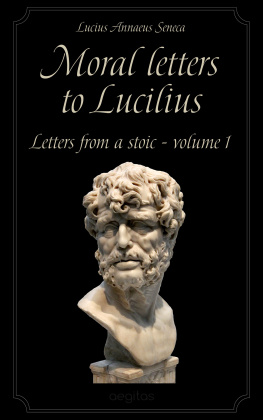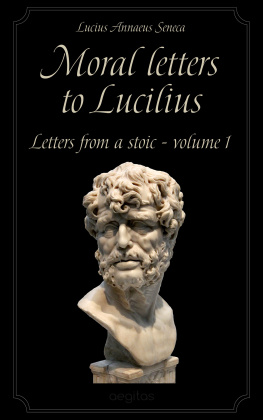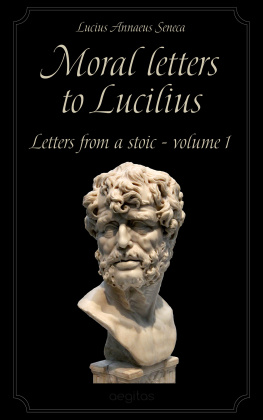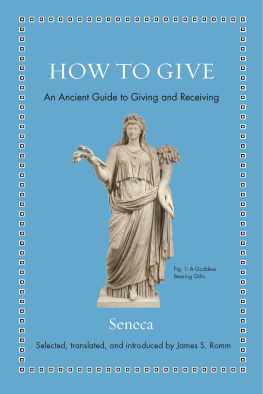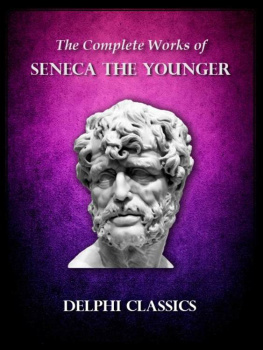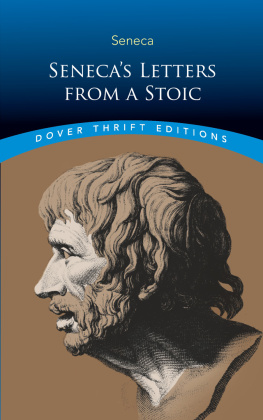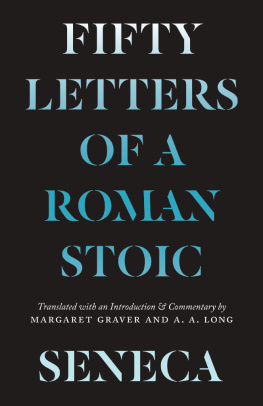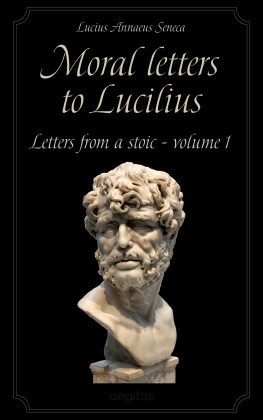
Lucius Annaeus Seneca
Moral letters to Lucilius
Volume 3
We have lost morals, justice, honor, piety and faith, and that sense of shame which, once lost, can never be restored.
encoding and publishing house
Notes
A philosopher of Naples, mentioned as giving lectures there: cf. Ep. lxxvi. 4.
i.e., "adequately," equivalent to .
For a complete definition of the Supreme Good cf. Ep. lxxi. 4 ff.
i.e., the Metronax mentioned above.
For the same phrase see Ep. lxvi. 30 and footnote.
Cf. Ep. lx. 4 mortem suam antecesserunt.
i.e., the Sun.
As in the original comitia centuriata, men between the ages of seventeen and forty-six.
As riches, health, etc.
i.e., Nature herself is eternal.
See, however, Seneca, N. Q. vii. 2. 3 sciamus utrum mundus terra stante circumeat an mundo stante terra vertatur. For doubts and discoveries cf. Arnold, Roman Stoicism, pp. 178 f.
See Index of Proper Names.
For technical terms in Epp. xciv. and xcv. see Appendix.
See Cicero, De Off. i. 3. 7 ff. for a full discussion of principles and duties. As one would expect, the Romans were more interested in practical precepts than were the Greeks.
Frag. 358 von Arnim.
In other words, that it is one of the "external" things, media, indifferentia
Compare, among similar passages, Ep. xxiv. 14 levis es, si ferre possum, brevis es, si ferre non possum
For the same figure, in the same connexion, see Ep. lxviii. 8 in pectore ipso collectio et vomica est
By means of hellebore, Lat. veratrum, the favourite cathartic of the ancients.
This is in harmony with the idea of Socrates; sin is a lack of knowledge regarding what is true and what is false.
i.e., Aristo and others.
monitio includes consolatio, dissuasio, obiurgatio, laudatio, and hortatio. Cf. 39 of this letter
Quoted also by Quintilian, vi. 1. 13. Between the years 58 and 54 B.C Calvus, a friend of the poet Catullus, in three famous speeches prosecuted Vatinius, one of the creatures of Caesar who had illegally obtained office.
Catonis Reliq. p. 79 Iordan.
From Publilius Syrus Frag. 250 Ribbeck.
A verse made up from Vergil, Aen. x. 284, and an unknown author.
i.e. who would abolish precepts.
A further answer to the objection in 17 above, where all madness is held curable by physical treatment.
See, for example, the Fifth Book, which opens with the preliminary remarks of the Athenian Stranger (pp. 726-34 St.).
A frequent thought in Seneca, cf. Ep. xxv. 6, lii. 8, etc.
Presumably Phaedo the friend of Plato and pupil of Socrates, author of dialogues resembling those of Plato.
Com. incert., Frag. 81 Ribbeck, and Pub. Syrus, Frag. 2 Ribbeck.
i.e., belief.
From Sallust, Jugurtha, x. 6.
Cf. Ep. xciv. 12 exactum indicium de fugiendis petendisque.
The last stage of knowledge complete assent according to the Stoic view, which went beyond the mere sensation-theory of Epicurus.
In this whole discussion Seneca is a much sounder Stoic than Aristo and the opposition. The next letter (Ep. xcv.) develops still further the preceptive function of philosophy through (progress) to (conversion).
This theme is carefully elaborated in Ep. vii., "On Crowds": "There is no person who does not make some vice attractive to us, or stamp it upon us, or taint us unconsciously therewith" ( 2).
These are fully discussed in Seneca's Naturales Quaestiones, a work almost contemporary with the Letters.
Both literally and figuratively, the sheen of the metal and the glitter of the false idea.
i.e., the bundle of rods and axes, carried by the attendants of a Roman magistrate.
A name usually applied to the eastern end of the Mediterranean.
Especially Thebes in 335 B.C, which he sacked. Athens and Sparta were treated with more consideration.
i.e., the Hyrcanians, and other tribes attacked during and after 330 B.C
Heracles in his various forms hails all the way from Tyre to the Atlantic Ocean; Dionysus from India through Lydia, Thrace, and the Eastern Mediterranean to Greece.
76 B.C
67 B.C
Beginning with the passage of the Manilian Law of 66 B.C
107 B.C (also 104, 103, 102, 101, 100, and 86).
102 and 101 B.C at Aquae Sextiae and Vercellae; the Jugurthine war lasted from 109 to 106 B.C
i.e., as Pompeius, Caesar, Marius.
i.e., as Pompeius, Caesar, Marius.
Literally, to pay money on the spot or perform a task without delay.
i.e., the department of "advice by precepts," discussed in the preceding letter from another angle. The Greek term is nearest to the Latin sub-division hortatio.
i.e., the pertness of a home-bred slave (verna).
The argument here is similar to Ep. lxxxviii. 20 hae... artes ad instrumenta vitae plurimum conferunt, tamen ad virtutem non pertinent.
i.e., philosophy.
Hippocrates belonged to the "Clinical" School; Asclepiades and his pupil Themison to the "Methodical." See Index of Proper Names.
"Axioms" and "postulates."
i. 54 ff.
Whether elementa and membra mean "letters and clauses" or "matter and forms of matter" is difficult to say.
i.e., before the advent of any theoretical philosophy.
verminatio, defined by Festus as cum corpus quodam minuto motu quasi a vermibus scindatur.
For this sort of Golden Age reminiscence see Ep. xc. 5 ff. and note.
Hippocrates.
Mushrooms, as in the case of the Emperor Claudius, were a frequent aid to secret murder.
The finest variety of garum was made from Spanish mackerel-roe.
Vergil, Aen. viii. 442.
Cf. Ep. xxxvii. 1 uri, vinciri, ferroque necari and note.
i.e., not reinforced by general dogmas.
>>The nota was the mark of disgrace which the censor registered when he struck a man's name off the list of senators or knights.
The genius was properly a man's alter ego or "better self": every man had his genius. For the colloquial use compare the "indulge genio" of the Roman poets.
See Index of Proper Names.
See Index of Proper Names.
A frequent vice under the Empire, nicknamed captatio.
, a subject handled by Panaetius, and by Cicero (De Officiis).
i.e., the significant features of athletics and adornment for men and women respectively.
Terence, Heautontimorumenos, 77.
Cf. Ep. xciv. 12 and note.
i.e., progressing from a in general to a .
Seneca characteristically ignores the unplesant half of the proverb: .
e.g., in the mysteries of Eleusis, etc.
For these terms see Spengel, Rhet. Graec., passim. Quintilian i. 9. 3 says ethologia personis continetur; and Cicero, De Orat. iii. 205, in a list of figures with which the orator should be familiar, includes characterismos, or descriptio.
For the same figure, similarly applied, see Ep. lxxx. 9 and note.
Vergil, Georg. iii. 75 ff.
For example, Cato had from the first opposed any assumption of illegal power, objecting to the consulship of Pompey and Crassus in 55 B.C., and to the conduct of Caesar throughout. His disapproval of both simultaneously is hinted in Plutarch's Cato the Younger, liv. 4.
The Latin term can hardly be reproduced, though "he did not regale but regulate" comes near it. Tubero's act was that of a true censor morum.
Cf. the words ducunt colentem fata, nolentem trahunt of Ep. cvii. 11.
For the best account of this scandal see Plutarch, Caesar, ix. f.
From stilla "a drop." The phrase is equivalent to our proverbial "last straw."
Next page
